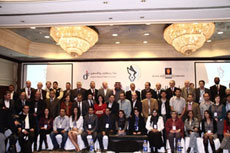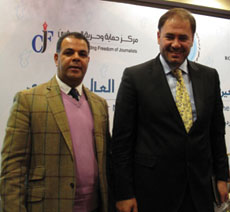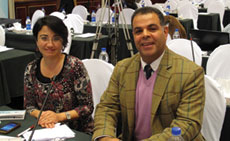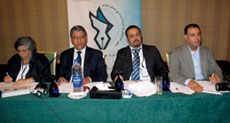
|
 |
 |
|
|
|
|
|
|
|
|
|
|
|
|
|
|
|
|
|
|
|
|
|
|
Forum for Media Freedom Defenders in the Arab WorldThe BHRM participated in the Forum for Media Freedom in the Arab World, held in Jordan on 5-7 December 2011. Many Arab and foreign human rights activists, journalists, actors, parliamentarians, judges, legal experts and specialised researchers attended the Forum. The main objectives of the Forum were to support and defend media freedom through strengthening networking among media freedom defenders; and enhancing collaboration between media professionals and human right activists. This is in order to institutionalise media-freedom defence efforts, prepare an Arab strategy to support media independence and media freedom, reduce violations against it and enhance societal environment nurturing of the media. The Forum was organised by the |Amman-based Centre for Defending Freedom of Journalists. The President of the BHRM participated in a number of discussions, including the new media and social networks. He contributed the following: Social network websites have broken the monopoly of state media and created many opportunities for the public to express themselves and have helped in the creation of a public opinion that serves specific causes. Although we cannot measure the effects of the new social networks websites, they undoubtedly have produced and re-published media materials which played an important role in moving the street. Social network websites also played a crucial role in organising public political movements and gave the youth the ability to co-ordinate their efforts in an unprecedented way. In other words, they played the old role of parties in organising, inciting and feeding the youth with information. This is as well as directing them towards political objectives far from censorship. The role of these websites was more important than the role of the media and some Arab satellite channels. This happened because the success of these revolutions depended not only on the directing of protests through the media, but also on the work of anonymous ordinary citizens to organise. As a result of this, the Arab revolutions did not have an identifiable leadership and thus made it difficult for the regimes to oppress them and for the political societies to control them. Contrary to the state media, which is misleading and lacking in credibility, the public media on the other hand proved to be able to win the trust of the public. The important issue is that network media belongs to the public and millions participate in them. The ability of governments to control social networking websites is very limited despite their attempts. With regards to the question: did the Arab media create and incite the revolutions or just covered the events? The Hasan Shafaie presented the following points: Some Arab media has played a part in promoting the Arab Spring such as the Al-Jazeera channel; while others merely covered the events. Despite the fact that most of the broadcasted material was created by the youth, some channels played the role of the inciter and their coverage had a specific political agenda. In general, the coverage of the Arab state media was not objective and resulted in the loss of many viewers and a lack of credibility. The priority for these channels was based on political agenda however; the BBC for example was the least affected because it was more professional in its comprehensive coverage of the events of all revolutions. With regards to the question of the roles of international human rights organisations and what they achieved during the Arab spring, Shafaie believes that their role has been positive. Their role was to monitor and document human rights violations which increased during the protest period. Their statements and their international relations played a fundamental role in exerting political pressure. Huge part of the international support for the movements of the Arab spring was due to the activities and the work of these organisations. |



